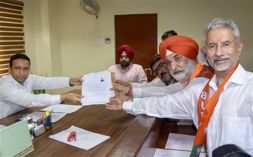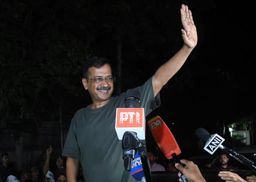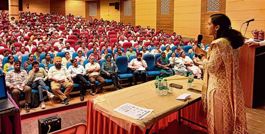
Prime Minister Narendra Modi, while counting his government’s numerous agriculture-related policy initiatives and interventions from the ramparts of the Red Fort on the occasion of the 72nd Independence Day, mentioned that a new agriculture export policy was on the anvil. Modi linked this new policy to his dream project of doubling farmers’ income by 2022 and claimed that this would open new competitive markets for Indian farmers.
In fact, the agriculture export policy which Modi boasted about, gains significance because this is the first time after Independence that a government in New Delhi has shown interest in formulating such a policy. The Ministry of Commerce floated a draft policy in March 2018 for all the stakeholders to discuss and give their inputs. And as the Modi government is barely left with any time before the 2019 general election, it is just a matter of time when the policy is promulgated as a statutory document.
The draft policy has set a target of increasing agri export up to $60 billion by 2022 from around current $33 billion. The target itself doesn’t procreate any enthusiasm, keeping in mind the fact that India’s agri-exports grew five times from $8.7 billion in 2004-05 to $42.6 billion by 2013-14. In 2014-16, it fell to $32 billion and rose marginally to $33 billion in 2016-17. Interestingly, both Radha Mohan Singh, Agriculture Minister, and Dalwai Committee Report on doubling farmers’ income have spoken about achieving a target of $ 100 billion in agriculture export by the same period, i.e 2022-23, which shows a disconnect between different departments and ministries over the issue. Moreover, in comparison with the progress achieved on this front during the UPA government, achieving a target of $60 billion does not sound impressive, at all.
Nevertheless, after judging the draft agri export policy by its intensions and provisions, it may be said that the Modi government has diagnosed the disease. How much of it would find place in the final policy remedies and how effectively shall the provisions be implemented, is another thing. The policy recommendations in this report are proposed to be organised in two broad categories: strategic and operational. While the strategic measures include policy -related recommendations, like government approach, state governments’ role, attitude towards infrastructure and logistics, the operational recommendations talk about aggregation, quality, export-centric production, export infrastructure, research and development, etc. The draft policy strongly advocates a stable trade policy regime. Using trade policy as an instrument to attain short-term goals of taming inflation, providing price support to farmers and protecting the domestic industry by successive governments has distorted India’s image in international trade as a long term and reliable supplier. To rectify the anomaly, the draft has promised a policy assurance that processed agricultural products and all kinds of organic products will not be brought under the ambit of any kind of export restriction (viz. MEP, export duty, export ban, etc).
The draft avows simplification or uniformity of mandi/agricultural fee across states. This could create a transparent supply chain that would empower the farmer, provide him wider access to markets and enable free trade across the country. Liberalising land lease norms is another promising endeavour which may encourage cultivators to invest in the land with a long-term visibility. Due to the discouraging laws in formalising land leases, an NSSO survey in 2012-13 revealedthat only 10.41 per cent of operational area under farming was on lease. This situation has created numerous problems, like negligible long-term farm investments, fallow lands, limited access to formal credit and skewed disbursement of government subsidies and direct benefit transfers for the small and marginal cultivators. If the policy could set it right, it would be a major boost to productivity and farmers’ income.
However, increasing agriculture export can’t guarantee a rise in farmers’ income automatically. Most part of today’s agri export is done by big traders and there is no way the farmers get the lion’s share of high export income. To set things right, the government needs to focus on empowering farmers with technical know-how and logistical support so that farmers themselves could become exporters. Although the draft policy talks about creating and developing farmers’ clusters, a proper system needs to be created for connecting farmers with international buyers. Agriculture and Processed Products Development Authority (APEDA) is the nodal agency for agri exports, but it has largely been playing a facilitator for traders only. “The whole system of exporting agri produce is skewed heavily in favour of big exporters. Farmers have no place in their scheme of things. APEDA has become a white elephant. Expecting any help would be a luxury when the system seems hell bent to discourage farmers to do things on their own,” says Rajaram Tripathi, National Coordinator of All India Farmers Alliance and a Bastar-based farmer, who also leads a group of farmers producing medicinal plants, with exposure in agri export markets for more than two decades.
The government must strengthen farmer-producer organisations (FPOs), so that farmers themselves control the agri value chain from the point of aggregation to post-harvest management activities like sorting, grading and packing. Although the draft policy has given enough thrust on creating logistical infrastructure from the hinterlands to ports, it would be worthwhile for the government to make special provisions for FPOs and SHGs willing to export their agri produce by themselves. As for trading in international markets, quality is all that matters, it is important to create awareness about the best cultivation practices among farmers. The issue of chemical residues is another sensitive matter for developed markets. Organic movement is still in the nascent stage in India. Although the Modi government is gung-ho about organic agriculture, it has its own limitations. So, instead of making it “either organic or as it is”, the government should focus on creating awareness about the usage of the right quantity of pesticides at right time and the concept of minimum residual level (MRL).
In short, the draft policy has made the right noises. Now the success of this maiden agri export policy will depend on three things. One, how effectively the notions are converted into policy framework. Two, how much are the states willing to make it a success because ultimately agriculture is a state subject. And three, how effectively the policy provisions are implemented on the ground. Once these three keys are plugged, numbers won’t have much significance, be it $60 billion or $100 billion as it would be the beginning of a new journey which would witness many new milestones.
— The writer is AVP, NCDEX. Views are personal





























